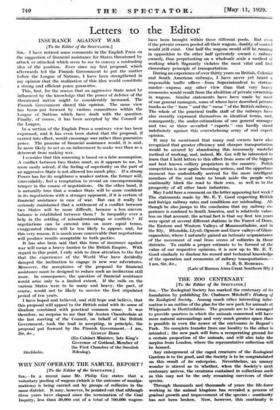Letters to the Editor
INSURANCE AGAINST WAR
[To the Editor of the SPECTATOR.] Sin,—I have noticed some comments in the English Press on the suggestion of financial assistance for States threatened by attack or attacked which seem to me to convey a misleading idea of the position. Ever since my first proposal, which afterwards led the Finnish Government to put the matter before the League of Nations, I have been strengthened in Tny opinion that the realization of this idea would constitute a strong and efficient peace guarantee.
This, first, for the reason that an aggressive State must be influenced by the knowledge that the power of defence of the threatened nation might be considerably increased. The Finnish Government shared this opinion. The same view has been. put forward by various committees within the League of Nations which have dealt with the question. Finally, of course, it has been accepted by the Council of the League.
In a section of the English Press a contrary view has been expressed, and it has even been stated that the proposal, if carried into effect, would encourage war rather than guarantee peace. The promise of financial assistance would, it is said, be more likely to act as an inducement to make war than as a deterrent from making war.
I consider that this reasoning is based on a false assumption. A conflict between two States must, as it appears to me, be more easily solved, if the feeling of superiority on the part of an aggressive State is not allowed too much play. If a strong Power has for its neighbour a weaker nation, the former will, unavoidably, feel a temptation to reveal an uncompromising temper in the course of negotiations. On the other hand, it is naturally true that a weaker State will be more confident in its negotiations with a stronger opponent, if it is certain of financial assistance in case of war. But can it really be seriously maintained that a settlement of a conflict between two States will be more difficult, because a less uneven balance is established between them ? Is inequality ever a help in the settling of misunderstandings or conflicts If negotiations can be entered into on more equal terms, exaggerated claims will be less likely to appear, and, for this very reason, it is much more conceivable that negotiations will produce results acceptable to both parties.
It has also been said that this form of insurance against war will mean a heavy burden to the British Empire. With regard to this point, I only wish to draw attention to the fact that the experiences of the World War have decidedly damped the inclination to engage in new war adventures. Moreover, the acceptance of the proposal for financial assistance must be designed to reduce such an inclination still more. In consequence, the question of financial assistance would arise only to a limited extent. If the calls on the various States were to be many and heavy, the pact, of course, would not be likely to survive the first stipulated period of ten years.
I have hoped and believed, and still hope and believe, that this proposal will appeal to the British mind with its sense of idealism combined with practical common sense. It was therefore, no surprise to me that Sir Austen Chamberlain at the last meeting of the Council, on behalf of the British Government, took the lead in accepting, in principle, the proposal put forward by the Finnish Government.—I am, Sir, &c., GUSTAF ROOS (Ex-Cabinet Minister, late King's Governor of Gotland, Member of the First Chamber of the Swedish










































 Previous page
Previous page